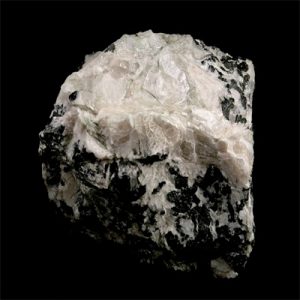Baratovite
Baratovite is a very rare silicate mineral that was discovered in 1974 at the Dara-Pioz Glacier, Dara-Pioz massif, Tien Shan Mountain, Alai Range, Tajikistan and approved as a new mineral species by the IMA in 1975. This location is an alkaline massif with boron-rich granitoids intruding into schists, crossed by metasomatite and pegmatite veins. It is host to 133 valid mineral species of which it is the Type Locality (TL) for 33 minerals including Baratovite and Sogdianite. This locality is in a very remote and hostile area and recent access has only been by helicopter.
Baratovite is white or white with slight pinkish tints, has vitreous to pearly luster and may look similar to Muscovite but is easily distinguished by its brilliant blue fluorescence under SW UV light. Baratovite was named in honor of Rauf Baratovich Baratov (1921- ), Soviet petrologist at the Institute of Geology, Dushanbe, Tajikistan.
Baratovite distribution: from the Dara-Pioz massif, Tien Shan Mountain, Alai Range, Tajikistan. On Iwagi Islet, Ehime Prefecture, Japan.
| Chemical Formula: | KLia3Ca7(Ti,Zr)2Si12O36F2 |
| Potassium Lithium Calcium Titanium Zirconium Silicate Fluoride | |
| Molecular Weight: | 1,408.90 gm |
| Composition: | Potassium | 2.78 % | K | 3.34 % | K2O |
| Lithium | 1.48 % | Li | 3.18 % | Li2O | |
| Calcium | 19.91 % | Ca | 27.86 % | CaO | |
| Zirconium | 3.24 % | Zr | 4.37 % | ZrO2 | |
| Titanium | 5.10 % | Ti | 8.50 % | TiO2 | |
| Silicon | 23.92 % | Si | 51.18 % | SiO2 | |
| Oxygen | 40.88 % | O | |||
| Fluorine | 2.70 % | F | 2.70 % | F | |
| — | — % | F | -1.14 % | -O=F2 | |
| 100.00 % | 100.00 % | = TOTAL OXIDE |
| Crystallography: | Monoclinic – Prismatic |
| Crystal Habit: | As platy deposits, to 5 cm; in patchy granular aggregates |
| Twinning: | Common on {001} |
| Cleavage: | Perfect on {001} |
| Fracture: | Conchoidal |
| Tenacity: | Brittle |
| Moh’s Hardness: | 3.5 – 4.0 |
| Density: | 2.92 (g/cm3) |
| Luminescence: | Brilliant bluish white fluorescence under SW UV |
| Radioactivity: | Barely Detectable; GRapi = 39.51 (Gamma Ray American Petroleum Institute Units) |
| Color: | White, white with pinkish tints |
| Transparency: | Transparent to translucent |
| Luster: | Vitreous, pearly in part |
| Refractive Index: | 1.672 – 1.673 Biaxial ( + ) |
| Birefringence: | 0.001 |
| Dispersion: | Strong; r > v |
| Pleochroism: |
None |


